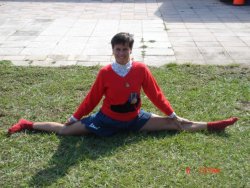From Therapy to a World Record
Swimming with cerebral palsy
While millions of “fully abled” people find swimming invaluable for fitness, for me it goes deeper: Swimming allows me to function as a “normal” person. Masters Swimming is an ideal way for me to stay fit. Born with cerebral palsy affecting my entire right side, I wore a brace on my right leg until I was in the fifth grade. I endured years of physical therapy growing up with the most valuable part of that therapy being swimming.
In my early years mom would make me swim a few laps before I could play. The lifeguards and swim coach would tell her, “You’re working her too hard.” But mom knew best. And my weekly doctor visits always began with, “How’s the swimming coming?” Today, I’m extremely grateful for those “aquatic therapy” sessions and you literally can’t get me out of the water as I swim my daily 4000 meters.
When I went away to college I decided to continue swimming for exercise. I knew down the road I’d be a basket case if I failed to heed my doctor’s words: “You have to swim until the day you die.”
While millions of “fully abled” people find swimming invaluable for fitness, for me it goes deeper: Swimming allows me to function as a “normal” person. I grew up unable to do simple tasks with my right hand -- moving pots and pans, holding a drink without spilling it. Swimming, along with running and cycling, has helped me build the motor skills necessary for such tasks.
At Masters practice I’m treated just like everyone else. I want the same workout (with adjusted intervals), to be challenged in the same manner, and not be pitied. Swimming has allowed me to maintain my flexibility, which is of the utmost priority for a spastic cerebral palsy person. Constant repetition helps me form stronger neural pathways for all manner of daily living tasks.
When I am in the water I do not worry about how I look to the world. I focus inward -- working with my strokes, how to make them better, and always how to go faster. Moving across the pool as efficiently as my body positioning will allow is what training is all about.
Age has not been a factor to my participation in swimming. I was 23 when I first competed, and 25 years later I have no plans of stopping.
When I go to Masters meets I am given great respect. I alert the officials that I can use only one arm for breast and fly. I swim all I can, from 50’s to 1500 Free. When I received my first high-point age group award in 1994 at the Stanton C. Craige Swim Meet in Fort Pierce, Florida, I was on Cloud Nine for weeks.
Swimming has provided a concrete purpose for my therapy. The road has not been easy.
I had to change my attitude and start out small. I could either sink through life or swim and enjoy what life has to offer. I choose the latter. Accomplishment of the small trials (drills) led to the ultimate (world record) and beyond. Swimming has me hooked.
Sue Moucha is a 4-time Paralympian with five swimming medals, including a Gold Medal and World Record in the 4 x 50 Freestyle Relay at the World Disabled Swimming Championships, New Zealand, 1998. She was the USMS 2005 Virtual Swim Series Female Overall Champion (606.86 miles). She has won over 200 awards from able-bodied sports events including running races, biathlons, triathlons, open water and Masters Swimming.
Categories:
SIGN UP FOR UPDATES FROM USMS

















